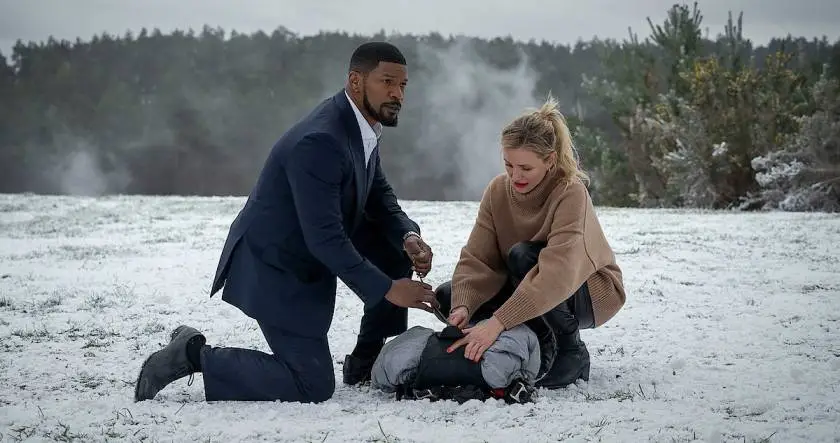To backtrack: Evan Hansen is a socially awkward, paralyzingly insecure 17-year-old who starts his first day of senior year with a written pep talk to himself, an assignment from this therapist. The note is intercepted off the printer by classmate Connor Murphy (Colton Ryan), a fellow outcast who interprets the letter’s mention of his sister Zoey (Dever), Evan’s crush, as a ploy to mock him. That is Evan and Connor’s only real-life interaction; Connor takes his life and is found with the letter, which his parents interpret as a suicide note to Evan. Stammering, desperate to please and feel valued, Evan parlays the theory into a full-fledged fantasy of friendship – one that endears him to Connor’s shellshocked mother, Cynthia (Adams) and stepfather Larry (Danny Pino), draws him into a romantic relationship with Zoey, and distances him from his overworked single mother Heidi (Moore). It also brings validation, when his false invocation of Connor’s memory goes viral, and hard-charging classmate Alana (Stenberg) creates a memorial mental health awareness campaign around one of Evan’s fake anecdotes.
The distance of the stage and Benj Pasek and Justin Paul’s enveloping, genuinely moving soundtrack allowed the musical’s darker, borderline creepy elements – suggesting blame for Connor’s death, Evan’s reincarnation of Connor through forged emails, the fact that the protagonist exploits a near-stranger’s suicide for popularity – to fade into the background of a great show. One can suspend moral judgment of Evan, firmly the sympathetic underdog, when his motivations, awkwardness and mistakes are routinely swept into absorbing song. That’s much harder to do when you’re staring, in hyper-definition closeup, into the face of the grieving mother, played with paper-thin fragility by Adams, as Evan lies about his friendship with her dead son.
Still, if you can get set aside the discomfort of Evan’s deceit and Platt’s ghoulish appearance, Dear Evan Hansen is a decently enjoyable movie musical, especially if you like the soundtrack, which remains magnetic. Chbosky’s direction grounds some of the potentially tricky aspects of adapting a musical to film – characters belting while in school, or long, searching solos, such as Dever singing about her lack of feeling over Connor’s death while careening toward a red light. The roving camera and interjections for Sincerely Me drew genuine laughs, as did several of the lines delivered by Nik Dodani as Jared, Evan’s only friend (and a “family” one, at that). The set is convincingly mid-2010s suburban high school, the Murphy’s kitchen believably rich McMansion everywhere. Dever, so endearing in Booksmart and heartbreaking as a disbelieved sexual assault survivor in Unbelievable, brims with vulnerability and frustration as Zoey, the most grounded character of the film.
It’s not the film’s fault that the medium highlights the story’s inherent stacking of the deck in favor of Evan with an ickiness the musical could maybe avoid. I cannot say the same for the casting of Platt as Evan. The movie asks the audience to not look at two elephants in the room, and unfortunately, no amount of soaring music can relieve that heavy a burden.
- Dear Evan Hansen in screening at the Toronto film festival and will be released in cinemas on 24 September
… as you're joining us from India, we have a small favour to ask. Tens of millions have placed their trust in the Guardian’s high-impact journalism since we started publishing 200 years ago, turning to us in moments of crisis, uncertainty, solidarity and hope. More than 1.5 million readers, from 180 countries, have recently taken the step to support us financially – keeping us open to all, and fiercely independent.
With no shareholders or billionaire owner, we can set our own agenda and provide trustworthy journalism that’s free from commercial and political influence, offering a counterweight to the spread of misinformation. When it’s never mattered more, we can investigate and challenge without fear or favour.
Unlike many others, Guardian journalism is available for everyone to read, regardless of what they can afford to pay. We do this because we believe in information equality. Greater numbers of people can keep track of global events, understand their impact on people and communities, and become inspired to take meaningful action.
We aim to offer readers a comprehensive, international perspective on critical events shaping our world – from the Black Lives Matter movement, to the new American administration, Brexit, and the world's slow emergence from a global pandemic. We are committed to upholding our reputation for urgent, powerful reporting on the climate emergency, and made the decision to reject advertising from fossil fuel companies, divest from the oil and gas industries, and set a course to achieve net zero emissions by 2030.












